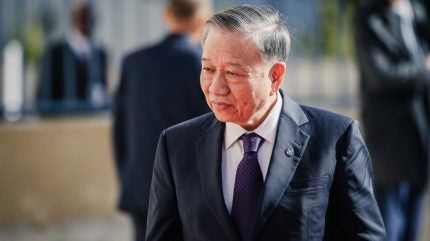Vietnam follows a foreign policy strategy dubbed ‘bamboo diplomacy’, a “firm but flexible” approach. The concept was first explicitly outlined by the country’s long-term leader Nguyen Pho Trong, who passed away this July, at the Vietnam Diplomatic Conference in 2016.
Trong restated the country’s commitment to bamboo diplomacy in 2021 at the National Congress on External Relations.

“Vietnam’s diplomacy is described as soft and wise, yet persistent and resolute. It is characterised by being flexible and creative in the face of all struggles and challenges that stand in the way of national independence and people’s happiness. At the same time, it remains consistent, courageous, resilient, united and humane. The diplomacy is committed to protecting national interests while demonstrating determination and patience,” he explained.
Bamboo diplomacy is built upon three main pillars: flexibility, neutrality and independence.
In practice, this has meant balancing diplomatic and economic relations with an array of partners while continuing to attract foreign investment. As geopolitical tensions rise around the world as a result of conflict, trade disputes and more, can Vietnam’s balance hold and do other countries have something to learn?
Bamboo diplomacy
The concept of bamboo diplomacy describes Vietnam’s relationship with two global superpowers: the US and China. Vietnam has had a mostly friendly relationship with their communist neighbour, barring some disputes regarding the South China Sea. Simultaneously, it has been growing ties with the US as it works to carve out a space in the semiconductor supply chain amid the global rise of export curbs.

US Tariffs are shifting - will you react or anticipate?
Don’t let policy changes catch you off guard. Stay proactive with real-time data and expert analysis.
By GlobalDataIn August, Vietnam’s new president, To Lam, made his first official visit to Beijing. Lam and Chinese President Xi Jinping reaffirmed the strong bilateral ties between the neighbours, and Lam said the relationship was a “top priority in Vietnam’s external policy”. They made agreements regarding railway cooperation, bilateral investments, infrastructure projects through the Belt and Road Initiative, and projects spanning agriculture, energy and the digital economy, among other fields.
Just a month later, Tam found himself in New York for the UN General Assembly meeting. The US and Vietnam have been growing bilateral ties, marking this effort with a strategic partnership agreed upon last year.
President Biden remarked on the increase in semiconductor investments that have gone into Vietnam since the partnership was announced, as the US seeks to counter the country’s ties with China. Officials familiar with the talks between the leaders, when asked whether they had discussed China, responded that “the leaders acknowledged the fact that Vietnam lives in a complicated neighbourhood”.
Vietnam’s attempt to maintain friendly relations between the two countries amid a fierce trade war seems to be working thus far.
Bamboo policy elsewhere
As geopolitical tensions grow worldwide, the need to balance relations with multiple powers to maintain economic stability seems to extend beyond Vietnam’s borders.
Discussing Saudi Arabia’s foreign direct investment (FDI) outlook for Investment Monitor, GlobalData economist Ollie Brown concluded that “the future of Saudi Arabian FDI hinges on whether diplomats can continue leveraging strong international politico-economic relations and attracting business, whilst simultaneously distancing themselves from geopolitical tensions”. In other words, it depends on whether Saudi Arabia can continue to perform its own version of neutrality and economic appeal, something Vietnam is a veteran at.
Following Bangladesh’s ousting of authoritarian leader Sheikh Hasina, there have been questions about how interim leader Muhammad Yunnus will balance ties between India and China. Yunus has been known to carry animosity for his country’s neighbour, but given the proximity and the economic exchange between the two, he will be forced to maintain a balance with both India and China as they also seek more influence in the region.
Will bamboo diplomacy be a viable long-term strategy? Or, as tensions heat up, will countries caught in the middle of world powers be forced to choose a side?





